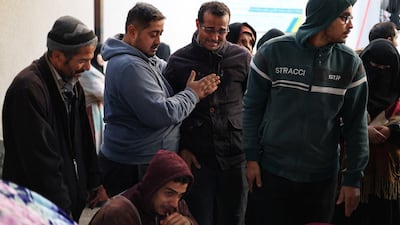Live updates: Follow the latest from Israel-Gaza
Over the past 135 days, Dr Ahmed Abu Mustafa witnessed more suffering than he's seen throughout his career – living through Israeli strikes and fighting taking place around the Nasser Hospital complex in Khan Younis in southern Gaza.
Dr Abu Mustafa, 26, spoke to The National after being forced to flee from the hospital, which had been besieged by Israeli forces for weeks.
On Thursday, Israeli forces launched a raid and told people in the hospital they had to leave.

In his final days there, Dr Abu Mustafa says he and the 1,500 people there had to drink salty water to survive, amid severe shortages of clean water, food and medical supplies.
There were only three other doctors in the emergency ward, he said.
These doctors were also helping colleagues in the surgical units and orthopaedics departments.
Overall, there were only a handful of medical doctors assisting more than 1,000 patients.
But even those who remained inside the hospital were not safe. Gaza's Ministry of Health said more than 10 people there were killed by Israeli forces in recent days.
Dr Abu Mustafa said in one incident an Israeli drone fired on doctors in the hospital.
“One day, while in the surgical department, I suddenly heard the sound of an Israeli quadcopter hovering near the window. It started firing into the room.”
Dr Abu Mustafa took cover, but one of his colleagues was not as lucky. “He was injured in the head, but we promptly treated him.”
More measures had to be taken to try to avoid attacks.
“We moved to the orthopaedics department, but an Israeli tank had targeted the department, resulting in one patient being killed and other doctors and nurses getting injured,” Dr Abu Mustafa said.

Israel claims it is after Hamas operatives in Nasser Hospital.
Since the siege, the Ministry of Health said drainage systems had been destroyed, causing sewage to flood the premises.
Upon hearing Israel's orders for the expulsion of more than 10,000 people in and around the hospital, Dr Abu Mustafa worried about his fate.
“We didn't understand their intentions – whether they intended to destroy the hospital over our heads or arrest and torture us.”
So, he left at 4 o'clock the following morning.
While on the way out, he passed an Israeli checkpoint where one of his colleagues, Ayman Kulab, was arrested.
Checkpoint humiliation
“Israeli forces instructed him to undress while dogs surrounded him. The soldiers laughed during this humiliating incident,” Dr Abu Mustafa said.
He went through Sea Street into Rafah, where 1.4 million Gazans – more than half of the entire population – are now displaced.
“We headed towards the western Rafah road and sat down to take a rest for 30 minutes because we had been awake for more than 48 hours.
“But the Israeli artillery targeted an area near us, so we immediately left and continued our journey.
“There were ongoing attacks along the road,” he said.
He walked until exhausted, then called for a car to pick up him and his colleagues.
After beginning to feel a sense of relief, Dr Abu Mustafa said an Israeli drone attacked the car.
“Our colleagues Dr Israa and Dr Mohammed Abu Lahia were injured, and we immediately rushed them to Kuwaiti Hospital.”
Dr Abu Mustafa said he saw destruction everywhere after the Israeli checkpoint.
“Every house was destroyed, and the streets, too,” he said.
“Military barracks were everywhere. Military vehicles were everywhere. Schools, mosques, and shops were also destroyed. Snipers were in every neighbourhood,” he said.
Khan Younis, once home to around 300,000 people, has been the most recent area to bear the brunt of Israel’s ground offensive.
The prospect of an assault on Rafah, packed with displaced Palestinians, has raised more international condemnation, with world leaders urging Israel not to proceed with the assault.
However, Israeli leaders insist the attack will go ahead.


